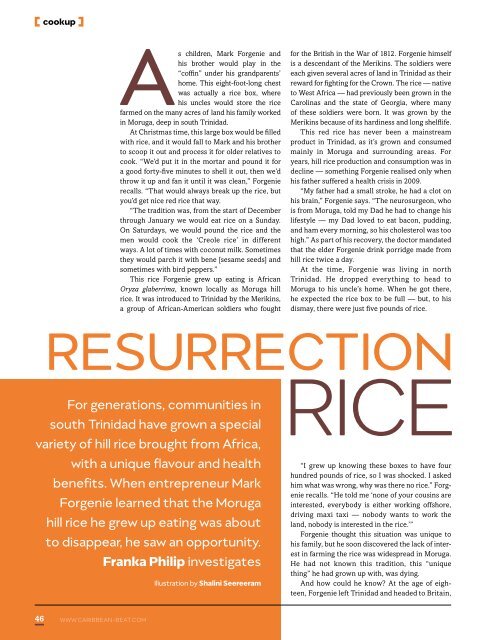Caribbean Beat — March/April 2019 (#156)
A calendar of events; music, film, and book reviews; travel features; people profiles, and much more.
A calendar of events; music, film, and book reviews; travel features; people profiles, and much more.
You also want an ePaper? Increase the reach of your titles
YUMPU automatically turns print PDFs into web optimized ePapers that Google loves.
cookup<br />
As children, Mark Forgenie and<br />
his brother would play in the<br />
“coffin” under his grandparents’<br />
home. This eight-foot-long chest<br />
was actually a rice box, where<br />
his uncles would store the rice<br />
farmed on the many acres of land his family worked<br />
in Moruga, deep in south Trinidad.<br />
At Christmas time, this large box would be filled<br />
with rice, and it would fall to Mark and his brother<br />
to scoop it out and process it for older relatives to<br />
cook. “We’d put it in the mortar and pound it for<br />
a good forty-five minutes to shell it out, then we’d<br />
throw it up and fan it until it was clean,” Forgenie<br />
recalls. “That would always break up the rice, but<br />
you’d get nice red rice that way.<br />
“The tradition was, from the start of December<br />
through January we would eat rice on a Sunday.<br />
On Saturdays, we would pound the rice and the<br />
men would cook the ‘Creole rice’ in different<br />
ways. A lot of times with coconut milk. Sometimes<br />
they would parch it with bene [sesame seeds] and<br />
sometimes with bird peppers.”<br />
This rice Forgenie grew up eating is African<br />
Oryza glaberrima, known locally as Moruga hill<br />
rice. It was introduced to Trinidad by the Merikins,<br />
a group of African-American soldiers who fought<br />
for the British in the War of 1812. Forgenie himself<br />
is a descendant of the Merikins. The soldiers were<br />
each given several acres of land in Trinidad as their<br />
reward for fighting for the Crown. The rice <strong>—</strong> native<br />
to West Africa <strong>—</strong> had previously been grown in the<br />
Carolinas and the state of Georgia, where many<br />
of these soldiers were born. It was grown by the<br />
Merikins because of its hardiness and long shelflife.<br />
This red rice has never been a mainstream<br />
product in Trinidad, as it’s grown and consumed<br />
mainly in Moruga and surrounding areas. For<br />
years, hill rice production and consumption was in<br />
decline <strong>—</strong> something Forgenie realised only when<br />
his father suffered a health crisis in 2009.<br />
“My father had a small stroke, he had a clot on<br />
his brain,” Forgenie says. “The neurosurgeon, who<br />
is from Moruga, told my Dad he had to change his<br />
lifestyle <strong>—</strong> my Dad loved to eat bacon, pudding,<br />
and ham every morning, so his cholesterol was too<br />
high.” As part of his recovery, the doctor mandated<br />
that the elder Forgenie drink porridge made from<br />
hill rice twice a day.<br />
At the time, Forgenie was living in north<br />
Trinidad. He dropped everything to head to<br />
Moruga to his uncle’s home. When he got there,<br />
he expected the rice box to be full <strong>—</strong> but, to his<br />
dismay, there were just five pounds of rice.<br />
Resurrection<br />
For generations, communities in<br />
south Trinidad have grown a special<br />
variety of hill rice brought from Africa,<br />
with a unique flavour and health<br />
benefits. When entrepreneur Mark<br />
Forgenie learned that the Moruga<br />
hill rice he grew up eating was about<br />
to disappear, he saw an opportunity.<br />
Franka Philip investigates<br />
Illustration by Shalini Seereeram<br />
rice<br />
“I grew up knowing these boxes to have four<br />
hundred pounds of rice, so I was shocked. I asked<br />
him what was wrong, why was there no rice.” Forgenie<br />
recalls. “He told me ‘none of your cousins are<br />
interested, everybody is either working offshore,<br />
driving maxi taxi <strong>—</strong> nobody wants to work the<br />
land, nobody is interested in the rice.’”<br />
Forgenie thought this situation was unique to<br />
his family, but he soon discovered the lack of interest<br />
in farming the rice was widespread in Moruga.<br />
He had not known this tradition, this “unique<br />
thing” he had grown up with, was dying.<br />
And how could he know? At the age of eighteen,<br />
Forgenie left Trinidad and headed to Britain,<br />
46 WWW.CARIBBEAN-BEAT.COM


















